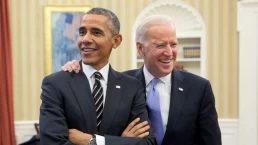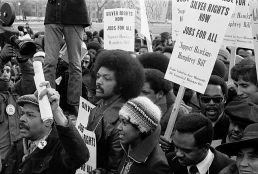Centrist politicians once based their whole pitch on the claim to possess “electability,” but now they can’t offer a sustainable formula for beating an increasingly militant right. They only develop a sense of urgency for the fight against the Left.
By Daniel Finn, Jacobin
Over the last ten years or so, the idea of a vital and virtuous political center that simply must hold in the face of irresponsible, demagogic populism has become one of the great clichés of Western political commentary. Armed with a few half-digested quotations from W. B. Yeats — a truly eccentric choice as the bard of moderation — politicians and pundits have claimed to be fighting the good fight against symmetrical extremes of left and right: Bernie Sanders and Donald Trump, Jeremy Corbyn and Nigel Farage, Jean-Luc Mélenchon and Marine Le Pen.
As the century’s third decade passes the halfway mark, the fundamental mendacity of this rhetorical framework is clearer than ever. The task of holding the center ground was supposed to lie in the hands of traditional parties of government that dominated the electoral field before the crash of 2008. Yet the mainstream right clearly has no interest in battling against the likes of Trump, Farage, or Le Pen. “Never Trump” Republicans and their European counterparts have been one of the most ineffective political tendencies in modern history, for all the attention they have received from the media, while the big battalions of conservatism gladly embrace ideas and individuals once considered beyond the pale.
Center-left politicians, on the other hand, have been ready to fight, fight, and fight again when faced with a challenge from their left flank. But they are unable (or simply unwilling) to muster the same combative spirit against the Right. Instead of stabilizing around a rejuvenated center, political life on both sides of the Atlantic is steadily moving rightward. This dynamic will not change unless the left-wing forces that have been aggressively pushed to the margins can regain some of their lost influence.

During the golden age of the Third Way, politicians like Bill Clinton, Tony Blair, and Gerhard Schröder based their pitch on the claim to possess “electability.” Their supporters had a simple message for left-wing critics: you might not like the compromises they insisted were necessary to win power, but the alternative was to remain trapped in opposition for an indefinite period of time. Media commentators delivered countless homilies about the need to choose between principle and pragmatism if you wanted to get things done.
Whatever you might say about their record of achievement in office, the Third Way figureheads certainly seemed to have sussed out the business of winning elections. Clinton became the first two-term Democratic president since the 1960s after more than a decade of Republican rule. His vice president, Al Gore, won the popular vote in 2000 and would have kept hold of the White House for the Democrats if not for shady maneuverings by Republican apparatchiks in Florida. Blair matched the achievement of Margaret Thatcher by winning three consecutive elections — the first Labour leader to do so in Britain. Schröder beat Germany’s Christian Democrats twice and only fell narrowly behind his party’s main electoral rival in a third contest.
Recent Posts
‘The Siege Must Be Broken’: Countries Called to Ship Fuel to Cuba After Trump Tariffs Struck Down
February 21, 2026
Take Action Now The US Supreme Court’s ruling “implies that Trump’s recent order imposing tariffs on countries selling oil to Cuba exceeds the…
Elite Depravity in Imperial Decline, A Zero Hour Conversation With Richard Wolff
February 20, 2026
Take Action Now “The system self-selects for psychopathy… the most sociopathically obsessive competitor and accumulator of personal power and…
Economics of Health For All: The Plan to Put Health at the Heart of the Global Economy
February 20, 2026
Take Action Now At the World Health Assembly in May, member states may endorse an unprecedented strategy declaring that health is not a cost – but…
The Left Owes a Lot to Jesse Jackson
February 19, 2026
Take Action Now As a movement builder, spokesperson, and candidate for the presidency, Jesse Jackson’s accomplishments were massive. He was one of…




